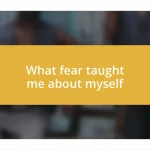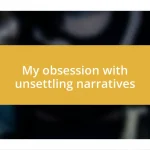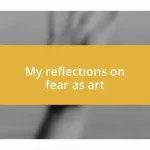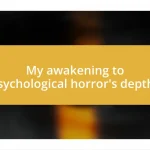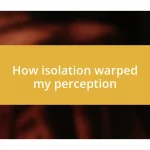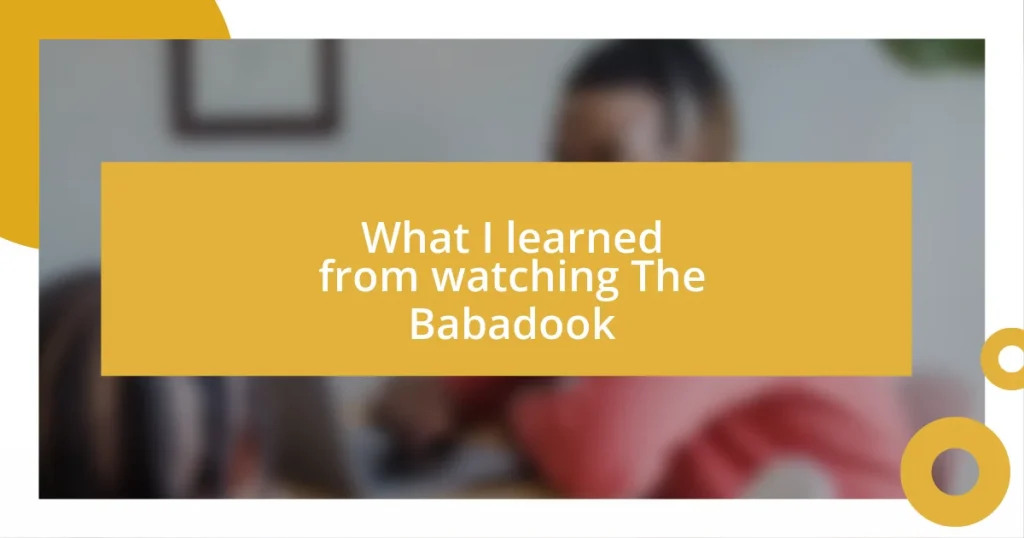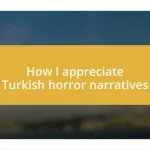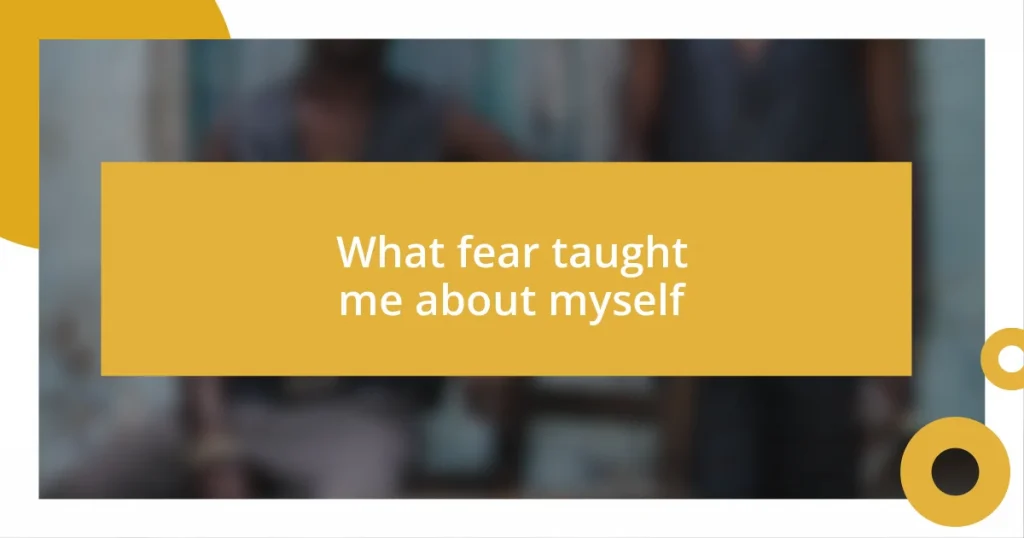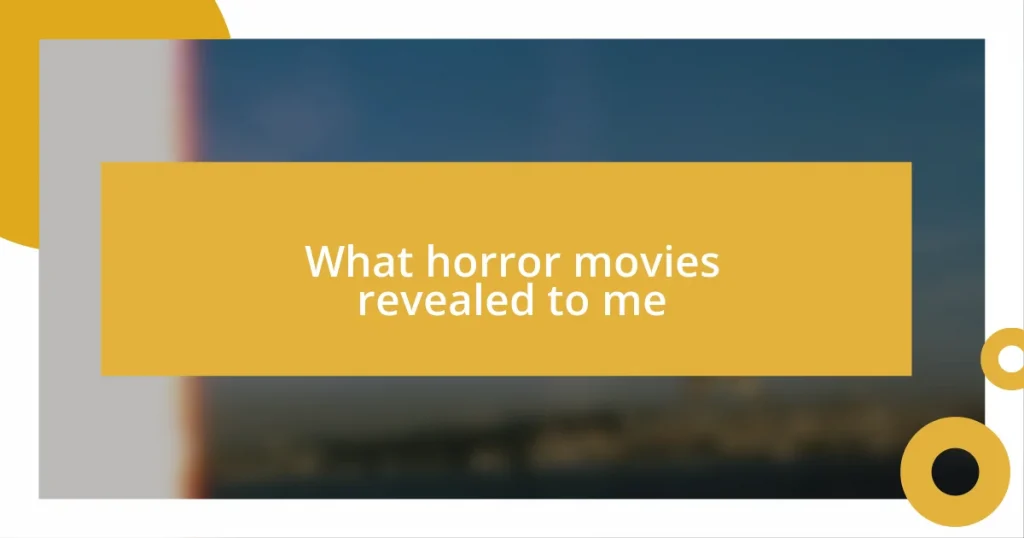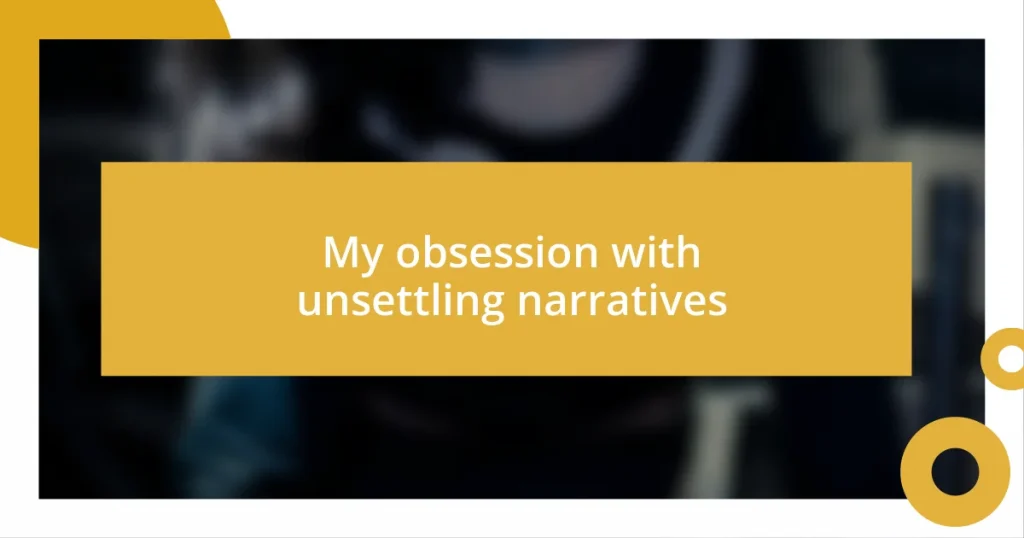Key takeaways:
- The Babadook represents Amelia’s unresolved grief and the importance of confronting inner demons to achieve emotional healing.
- The film explores the complexities of motherhood, highlighting the challenges of parenting while dealing with grief and emotional turmoil.
- Resilience and hope emerge from navigating pain, emphasizing that acknowledging struggles can lead to growth and deeper understanding within oneself and in relationships.
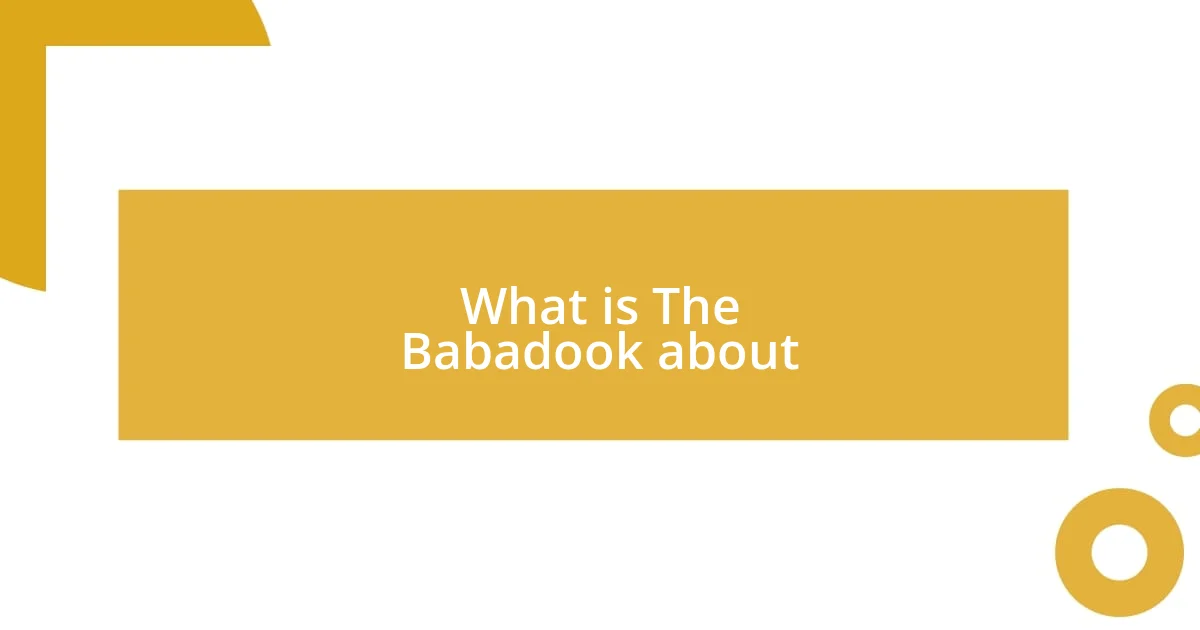
What is The Babadook about
At its core, The Babadook is a story about grief and the haunting power of unresolved trauma. The film follows Amelia, a widow struggling to cope with the loss of her husband while raising her troubled son, Samuel. Isn’t it fascinating how fear can sometimes manifest as an external threat? In Amelia’s case, the sinister figure of the Babadook becomes a tangible representation of her inner turmoil.
As the narrative unfolds, we see how the Babadook symbolizes not just Amelia’s grief but also her suppressed emotions. I remember watching scenes where her anger and despair seemed to visually morph into the monstrous entity, making me reflect on how often we bury our feelings, only for them to resurface in terrifying ways. Have you ever felt overwhelmed by emotions you didn’t know how to express? That’s the essence of Amelia’s struggle; she lives in constant conflict with her fears and desires.
The film invites us to explore the concept of confronting one’s demons. I found myself empathizing deeply with Amelia as she battled both the Babadook and her own feelings of inadequacy and isolation. It raises a powerful question: can we ever truly escape from the shadows of our past, or must we learn to live alongside them? In this way, The Babadook goes beyond horror; it’s a poignant meditation on motherhood, loss, and the importance of embracing our dark sides to emerge into the light.
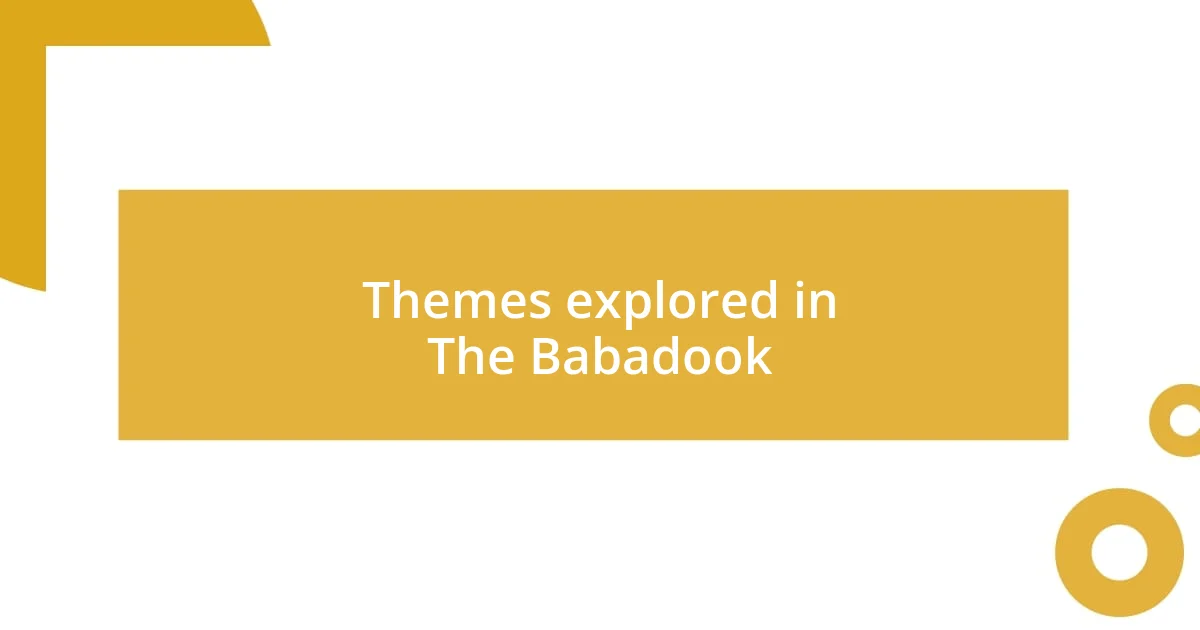
Themes explored in The Babadook
One of the most striking themes in The Babadook is the exploration of parental anxiety and the struggle for emotional stability. As I watched Amelia’s mounting frustration towards her son Samuel, I remembered how difficult it can be to manage feelings of inadequacy while being a caregiver. The film poignantly captures the exhausting cycle of motherhood, where love often intertwines with fear and uncertainty. This dynamic made me reflect deeply on my own experiences, where the weight of expectations sometimes leads to emotional outbursts rather than understanding.
- The impact of grief: The Babadook embodies Amelia’s unresolved loss, showcasing how grief can transform into a haunting presence if left unaddressed.
- Confrontation with inner demons: The narrative pushes viewers to consider the necessity of facing our darkest emotions rather than suppressing them.
- The nuances of motherhood: It highlights the complexities of motherhood, reminding us that vulnerability and strength can coexist in a parent.
- The challenge of acceptance: The film encourages a dialogue about embracing rather than denying fear and sadness, promoting emotional honesty.
In a particularly intense moment, I felt a chill when Amelia finally acknowledged the Babadook’s presence and her fears took center stage. It resonated with me, as I’ve often found that stifling emotions only amplifies their power. Just like Amelia’s journey, the film leads us to question whether the aim is to conquer our fears or learn to coexist with them. This theme of acceptance resonates powerfully, suggesting that facing our personal monsters can lead to deeper understanding and healing.
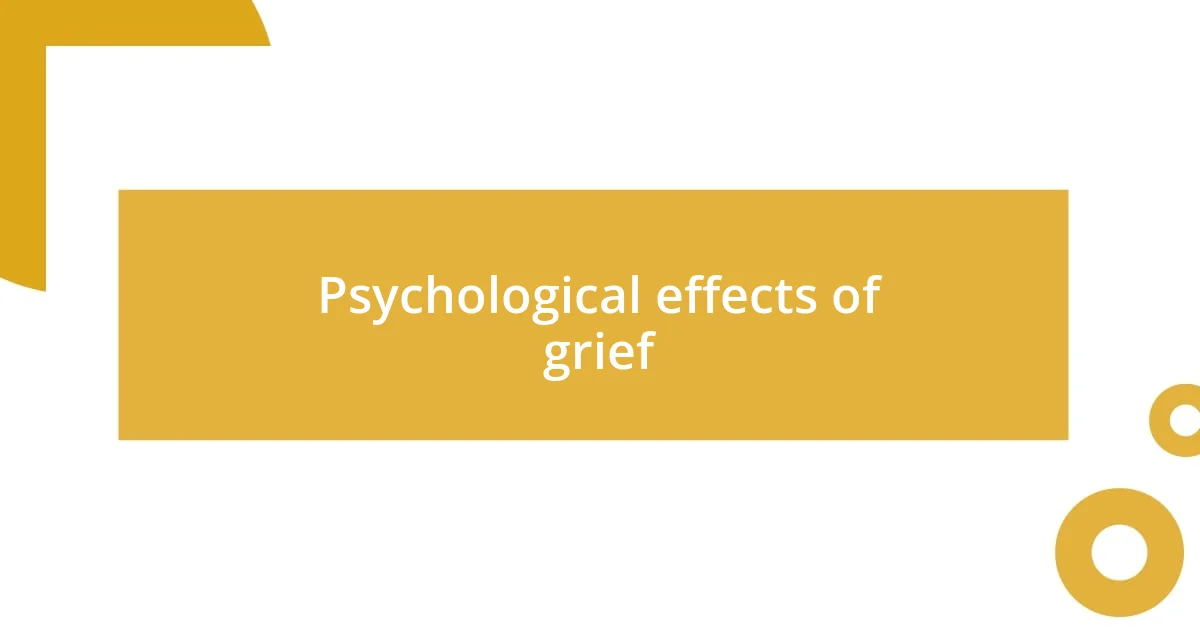
Psychological effects of grief
Loss can have profound psychological effects, and The Babadook vividly illustrates this through Amelia’s character. Grief can manifest not just as sadness but as anger and frustration—feelings that are often buried deep. I recall times when I faced emotional turbulence after a loss, and it reminded me of how easy it is to become consumed by those unresolved feelings. Have you noticed how grief can sneak up on you when least expected, reshaping your reality?
As I observed Amelia struggle, it struck me that grief can lead to isolation. Amelia feels increasingly alone in her feelings, which speaks volumes about how we tend to detach from others during our darkest moments. I reflect on my own experience when I lost a close friend; the isolation felt suffocating, much like the oppressive atmosphere in the film. The Babadook becomes a chilling metaphor for the loneliness that often accompanies loss, making it clear that confronting grief is essential to healing.
Moreover, the film showcases the cyclical nature of grief—how it can feed on itself if left unacknowledged. Each time Amelia tries to push her feelings aside, they only seem to grow stronger, feeding the very monster she dreads. I remember grappling with my emotions while navigating life’s changes; it became clear that repressing those feelings only intensified their grip on my well-being. The Babadook brilliantly encapsulates this struggle, underscoring the importance of facing our grief instead of allowing it to fester and define us.
| Psychological Effects of Grief | Examples from The Babadook |
|---|---|
| Emotional Turbulence | Amelia experiences intense anger and confusion as she suppresses her grief. |
| Isolation | Amelia feels increasingly detached from friends and family as her grief isolates her. |
| Cyclical Nature | The Babadook symbolizes Amelia’s unaddressed grief, growing stronger as she avoids it. |
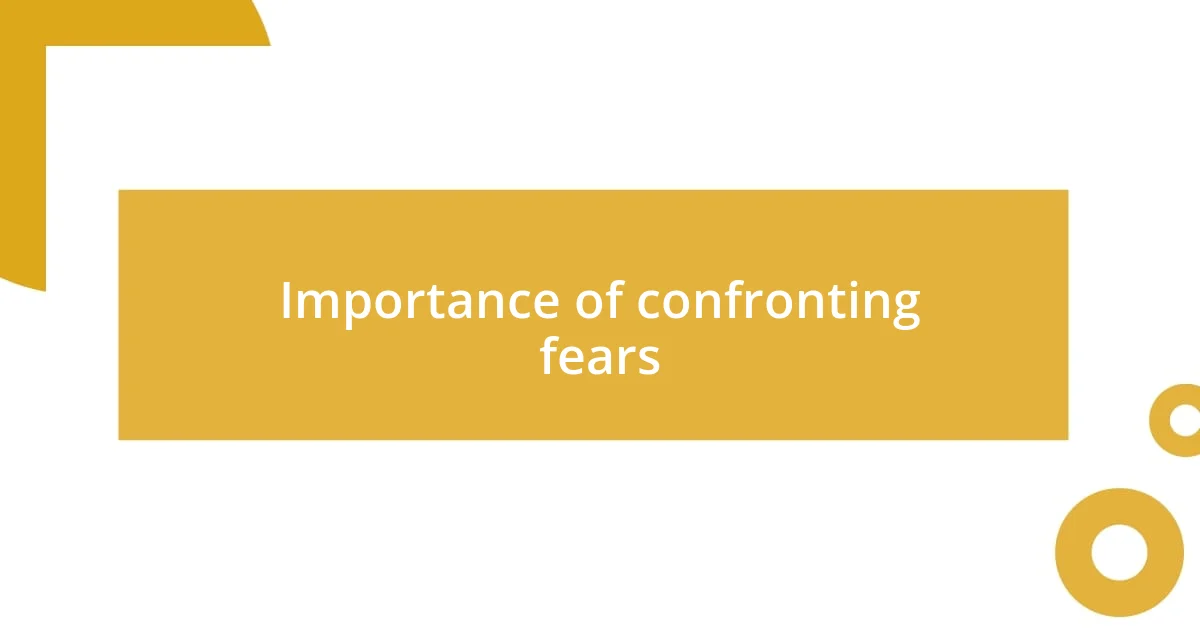
Importance of confronting fears
When we confront our fears, we often discover how they shape our lives. I remember standing before a large crowd for the first time, convinced I would crumble under the pressure. However, as I faced that daunting situation, I realized that acknowledging my fear was the first step toward overcoming it. Just like in The Babadook, Amelia’s confrontation with her fear leads to a chaotic yet profound transformation. Isn’t it true that sometimes, it’s the very act of facing what terrifies us that reveals our strength?
The importance of facing our fears can’t be overstated. I’ve found that when I avoid things that scare me—like public speaking or confronting uncomfortable truths—I only let those fears grow. It’s almost as if they gain strength from my avoidance, much like the Babadook grows more powerful with Amelia’s denial. I can’t help but wonder: what fears are you holding onto, and how might they be influencing your daily life?
In thinking about confrontation, I also see empathy playing a critical role. Amelia’s journey with the Babadook illustrates the need for understanding our fears rather than simply battling them. I’ve realized that embracing our vulnerabilities can facilitate healing. When we recognize our fears as part of our experience, they no longer have the same hold over us. Isn’t it inspiring to think that simply facing our fears, rather than running from them, can lead to deeper self-awareness and ultimately, empowerment?
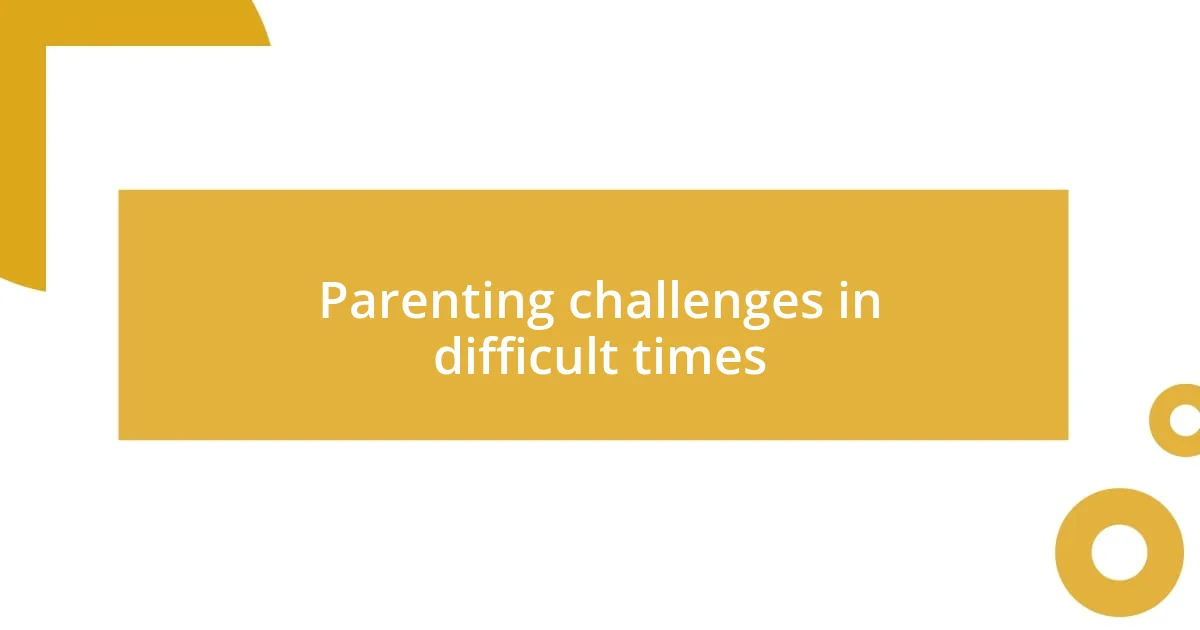
Parenting challenges in difficult times
Navigating the complexities of parenting during tough times can feel overwhelming. I remember grappling with my own challenges when I became a parent while juggling grief. Balancing my child’s needs with my emotional turmoil was a tightrope walk. Have you ever felt like you were merely surviving each day, trying to be present while battling your own inner demons?
In The Babadook, we see Amelia struggling to balance her grief with her role as a mother. There were moments when I felt myself being short-tempered or impatient with my kids, not because they were doing anything wrong, but because I was weighed down by my own burdens. It’s a stark reminder that our emotional states can seep into our parenting, affecting our interactions and our children’s wellbeing. I often wonder how many parents quietly fight these battles, masking their pain for the sake of their children while hoping to shield them from life’s harsh realities.
Moreover, the film communicates an essential truth about vulnerability. Sharing our struggles with our children can be a double-edged sword—should we let them see our sorrow? I’ve found that it can actually foster authentic connections. By acknowledging my feelings, I encourage my kids to express their emotions openly, just as Amelia learns to confront the Babadook. Perhaps, in our attempt to protect them from hardship, we miss an opportunity to teach resilience and empathy. What do you think? Is the risk of vulnerability worth the potential for deeper understanding within our family?
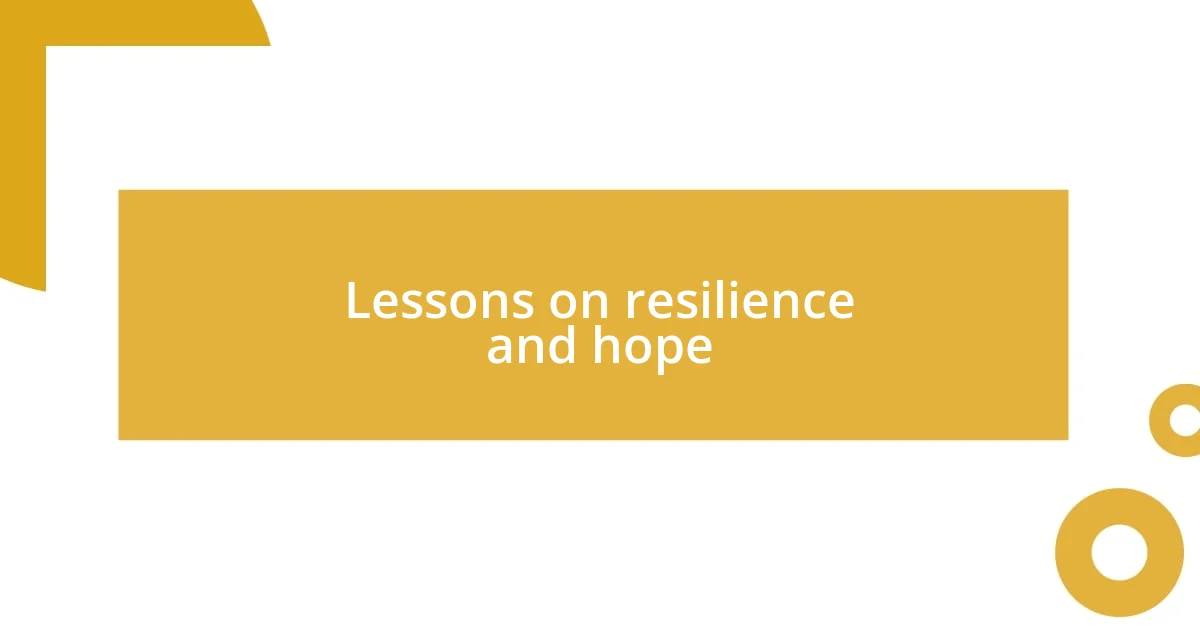
Lessons on resilience and hope
Resilience is often born from struggle, and I’ve come to realize that hope can be a powerful driving force. Watching The Babadook reminded me of my own battles with adversity. There was a time when I faced a significant setback professionally, and I felt as though I was drowning in despair. But, much like Amelia’s journey, I learned that hope is not just about wishing for a better outcome; it’s about taking tangible steps to build a brighter future. Have you ever found yourself clinging to hope in your darkest moments?
In The Babadook, Amelia’s transformation highlights how resilience grows when we learn to navigate our pain rather than being consumed by it. I recall moments in my life where I thought I’d never emerge from grief, yet each small step forward—like seeking support or finding joy in little things—became a catalyst for healing. It’s fascinating to see that even when everything feels bleak, there’s potential for growth if we just keep moving forward. Are there small acts in your own life that spark a flicker of resilience during tough times?
What strikes me deeply is how Amelia ultimately finds a way to coexist with the Babadook. This teaches us that resilience doesn’t mean erasing our fears or minimizing our struggles; rather, it’s about learning to live with them while moving forward. I’ve found solace in understanding that it’s okay to acknowledge my pain while still seeking joy and growth. Isn’t it empowering to think that our challenges can become part of our story rather than our whole narrative?
